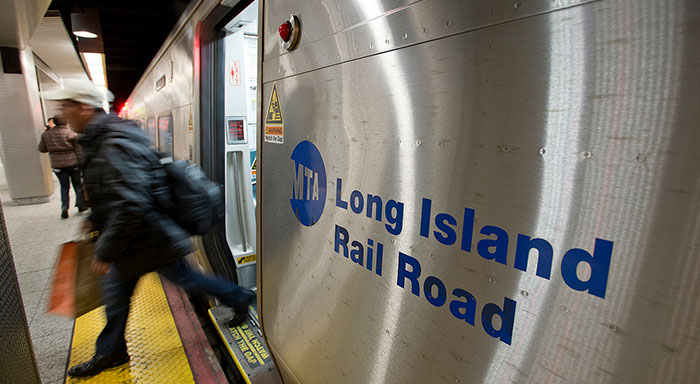Photo Courtesy of MTA/Patrick Cashin
By Forum Staff
The Long Island Rail Road’s limited plans for handling unexpected incidents and poor communications to riders exacerbated the impact of train delays and cancelations this past winter, according to an audit recently released by State Comptroller Tom DiNapoli.
The State’s fiscal watchdog said he initiated the investigation to determine whether the LIRR has plans for handling unexpected delays and incidents and whether the plans were carried out and adequately met passengers’ needs.
The audit examined LIRR’s response to some of the 2,004 trains that were canceled or delayed by 15 minutes or more between Dec. 1, 2017 and Jan. 24, 2018. It sampled 11 of the train delays based on date, time of day (i.e. rush hour), branch and type of delay. Late or canceled trains during those 11 events directly impacted 745 trains and an estimated 331,720 passengers (using LIRR estimates of regular ridership). Among the findings:
• LIRR did not have a plan for five of the 11 events examined, including two rail yard derailments and two incidents of people being struck by a train. The LIRR Guideline does not discuss these type of events, or how to provide service when they occur, DiNapoli noted.
• Of the remaining six events with plans, none of them followed all the required steps. Failure to follow all steps can increase delays and cause cancelations.
• Communications to passengers in four incidents were not made or were late.
• LIRR could not document that buses ordered to expedite the movement of passengers during four events arrived and/or were effectively used to move passengers.
The comptroller’s audit also made the following recommendations:
• Review recent incidents and ensure plans are developed to cover the major types of incidents that have had a significant impact on passengers.
• Document which plan or protocol is implemented for each incident, and whether an incident commander was appointed.
• Develop a process to manage bus service during an incident, including notifications to customers of the availability of bus service. Ensure that the use of bus service is documented (e.g. that they arrived, and when they are assigned to particular location or service).
• Develop standard alternative service plans for each main line and branch, to be implemented should service be suspended (including alternative train or bus support). Provide information regarding where passengers can reasonably go in the event service is interrupted.
• Ensure customers are notified in a timely and continuous manner throughout an incident.
DiNapoli noted that LIRR “generally agreed” with all of the audit’s recommendations and said it has already implemented, or is in the process of implementing changes.
“There is no question that LIRR has some tough challenges to overcome, and faced many unexpected incidents this past winter, but it can provide its riders with better service by improving preparations for major disruptions, alternative transportation and communication with passengers,” the comptroller said. “LIRR is an important part of the New York City metro-area economy and needs to run smoothly and efficiently.”

